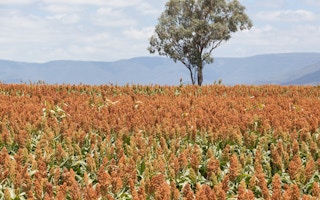Climate forecasts to 2050 suggest sorghum is set to remain Queensland’s top crop as temperatures rise and rainfall decreases across the State.
Researchers from the Queensland Alliance for Agriculture and Food Innovation (QAAFI) forecast a relatively healthy future for sorghum crops, but see challenges looming for wheat production.
Project leader Professor Graeme Hammer said the research drew on major global climate models to predict rainfall and temperature changes and run simulations for the next 30 years, to understand the impact on cropping in Queensland.
QAAFI is a partnership between the University of Queensland and the Queensland Government.
Professor Hammer said the outlook for sorghum was not all bad, although impacts varied from region to region.
“Providing that we start breeding sorghum for heat stress adaptation now, the modelling shows that in the next 30 years there is not likely to be much more variability than there currently is,” Professor Hammer said.
“Even with increasing heat stress events and reduced summer rainfall predicted under the climate modelling, the impact on sorghum yields to 2050 are offset by the increasing CO2 in the atmosphere, which enables the sorghum plant to use water more efficiently for growth.”
Professor Hammer said the situation was more challenging for wheat crops.
“While the modelling shows there will be a reduction in summer rainfall, when sorghum crops are planted, there is even more of a decrease in winter rainfall, when wheat crops are planted, which increases risk of drought stress,” Professor Hammer said.
“However, increased temperature will tend to shorten the growing season and counter the effect of limited water supply to some extent.”
He said increasing temperatures would cut wheat yield in some regions.
Professor Hammer said researchers from QAAFI, the Department of Agriculture and Fisheries and the Commonwealth Scientific Industrial Research Organisation (CSIRO) were working with the Grains Research and Development Corporation to improve the heat tolerance and water use efficiency in sorghum and wheat crops to deal with climate risks.
The research is supported by a $4 million Bill & Melinda Gates Foundation grant for sorghum “drought-proofing” work.
“Sorghum is a staple food for about 500 million people around the world, and had significant nutritional qualities,” Professor Hammer said.
Professor Hammer will present an analysis of projected heat and drought stresses across Queensland to 2050 at the TropAg conference in Brisbane this week.










